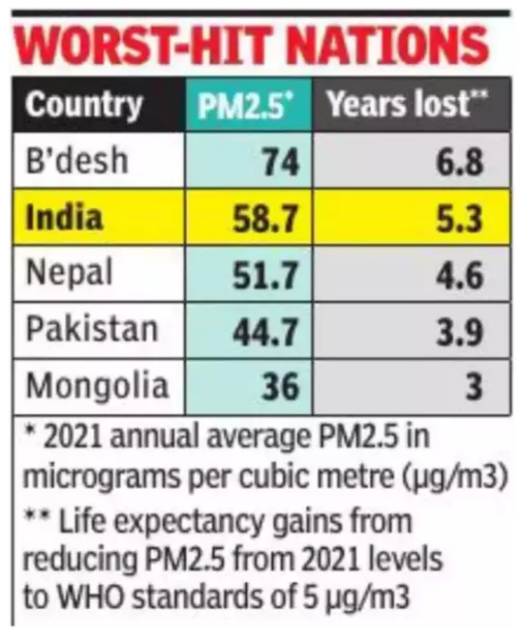Context:
According to the Air Quality Life Index (AQLI) report for 2023, air pollution shortens the lives of the residents of Delhi by around 11.9 years.
Highlights of Air Quality Life Index (AQLI) report

- Ranking: India ranked second among the countries worst hit by air pollution with Bangladesh topping the list.
- Nepal ranked third followed by Pakistan and Mongolia.
- PMI in South Asia: Particulate pollution has increased 9.7 percent from 2013 to 2021 in South Asia.
- In India, PM2.5 levels rose 9.5 percent; in Pakistan 8.8 percent; and in Bangladesh, levels rose by 12.4 percent over this same time interval.
- Life Expectancy: An average Indian citizen loses around 5.3 years of life expectancy due to air pollution.
- While an average citizen in Bangladesh loses 6.8 years of their life to air pollution
- An average Chinese citizen has seen an improvement — from 4.7 years of life expectancy being lost in 2013 to 2.5 now, an improvement of 2.2 years,
- Pollution in India: Pollution in India has increased from 56.2 µg/m3 in 2020 to 58.7 µg/m3 in 2021.
- This is more than 10 times the WHO guideline of 5 µg/m3.
- Health Risk: Pollution is biggest threat to human health in India in terms of lowering life expectancy, beating cardiovascular diseases and child and maternal malnutrition.
- While particulate pollution takes 5.3 years off the life of the average Indian, cardiovascular diseases reduce life expectancy by about 4.5 years, and child and maternal malnutrition reduces life expectancy by 1.8 years.
- Poor AIr in Delhi: It is the most polluted city in the world.
- Delhi’s annual average PM2.5 level in 2021 was found to be 126.5 µg/m3, which is more than 25 times the World Health Organization (WHO) guideline of 5 µg/m3.
- Delhi residents are on track to lose 11.9 years of life expectancy on average relative to the WHO limit and 8.5 years relative to the national guideline if the current pollution levels persist.
About Air Quality Life Index (AQLI)
- AQLI measures the impact of particulate pollution on life expectancy.
- It is released by Energy Policy Institute at University of Chicago (EPIC).
News Source: Indian Express
![]() 31 Aug 2023
31 Aug 2023

